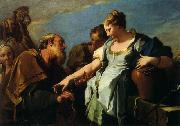Porslinet engros- Olja måleriet Engros- Måleriet Porslinet |
|||||||||||

|
|||||||||||
|
|
|
||||||||||||||
|
Giambattista Pittoni
(1687 -- 1767) was an Italian painter of the late-Baroque or Rococo period, active mainly in his native Venice. Pittoni is best known for his "grand-manner" canvases depicting religious, historical, and mythological subjects (such as Sophonisba and Polyxena). He was a co-founder of the official painter's academy in Venice (in competition to the old fraglia or painter's guild), the Accademia di Belle Arti di Venezia, and he succeeded as President (1758?C1761) his contemporary Giovanni Battista Tiepolo. Pittoni never left his native Venice, but completed commissions from German, Polish, Russian, and Austrian patrons. His mature palette was noted, as was Tiepolo's, for his lightness of tone. Besides Tiepolo, Pittoni's influences were Giovanni Battista Piazzetta, Sebastiano Ricci, and Antonio Balestra. His paintings were of a Rococo style, but later became more sedate in their approach towards Neoclassicism. |
||||||||||||||
|
|
||||||||||||||
|
||||||||||||||
|
|
||||||||||||||
| Giambattista Pittoni
(1687 -- 1767) was an Italian painter of the late-Baroque or Rococo period, active mainly in his native Venice. Pittoni is best known for his "grand-manner" canvases depicting religious, historical, and mythological subjects (such as Sophonisba and Polyxena). He was a co-founder of the official painter's academy in Venice (in competition to the old fraglia or painter's guild), the Accademia di Belle Arti di Venezia, and he succeeded as President (1758?C1761) his contemporary Giovanni Battista Tiepolo. Pittoni never left his native Venice, but completed commissions from German, Polish, Russian, and Austrian patrons. His mature palette was noted, as was Tiepolo's, for his lightness of tone. Besides Tiepolo, Pittoni's influences were Giovanni Battista Piazzetta, Sebastiano Ricci, and Antonio Balestra. His paintings were of a Rococo style, but later became more sedate in their approach towards Neoclassicism. Date 18th century Medium Oil on canvas Dimensions 168 X 130 cm (66.14 X 51.18 in) cyf |
||||||||||||||
|
Related Paintings to Giambattista Pittoni :. |
||||||||||||||
|
|
||||||||||||||
|
|
||||||||||||||
|
KOMMA I KONTAKT MED Oss |







